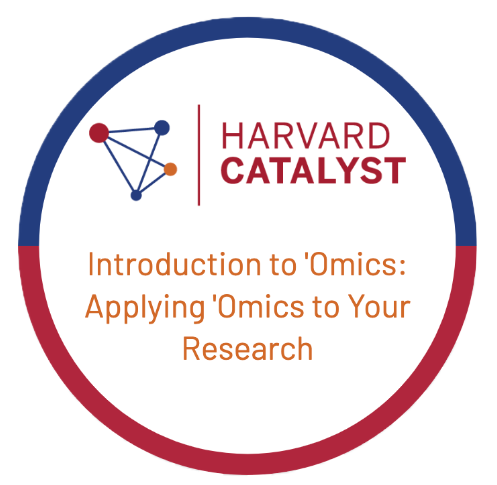Course badge
All course participants may receive a downloadable digital badge (shown below) that can be added to email signatures, LinkedIn profiles, and more.

For more information:
Email UsCourse Goals
- Understand the scope of omics research and methods in: genomics, epigenomics, transcriptomics, proteomics, and metabolomics
- Understand omics in terms of investigation for your biological questions (disease etiology, diagnosis, and treatment)
- Learn about the importance of experimental design in omics research
- Understand the challenges and limitations of big data analysis, including integration of data, batching, computational resources, and working with team members across all fields.
Omics is a rapidly evolving, multi-disciplinary, and emerging field that encompasses genomics, epigenomics, transcriptomics, proteomics, and metabolomics. Each of these fields offers the possibility to understand and view biology from a global perspective in a way that was previously unthinkable. High-throughput methodologies can rapidly provide a global picture of the processes within cells at multiple levels, allowing for accelerated discoveries in health and disease.
As sequencing technologies improve and costs decline, it’s imperative for biomedical researchers to build a foundational understanding of managing large omics datasets. This online course will cover the different omics areas, including their appropriate applications and experimental challenges.
Session dates
February 14 – August 7, 2024
Time commitment
Self-paced online videos and course work over six months.
Audience
- An introduction to the principles of omics research.
- Investigators who would like to integrate omics approaches into their research.
- We believe that the research community is strengthened by understanding how a number of factors including gender identity, sexual orientation, race and ethnicity, socioeconomic status, culture, religion, national origin, language, disability, and age shape the environment in which we live and work, affect each of our personal identities, and impacts all areas of human health.
Eligibility
MD, PhD, DMD, PharmD, DNP, ScD, or equivalent.
Fee
- Free for Harvard-affiliated institutions
- Non-CTSA member: $1250.00
- CTSA member: $935.00 (Note: this is a 25% discount off the standard fee.)
- Cancellation and Refund Policy [PDF]
-
To inquire about available discounts, contact us.
- Additional 10% off for nurses and Allied Health Professionals (can be combined with other discounts)
- Community Partners of Harvard Catalyst Programs
- Countries with GNI below $13,000
Accreditation Statement
The Harvard Catalyst Education Program is accredited by the Massachusetts Medical Society to provide continuing medical education for physicians.
Harvard Catalyst Education Program’s policy requires full participation and the completion of all activity surveys to be eligible for CME credit; no partial credit is allowed.
Register
Registration is currently closed. Please check back for future opportunities.

